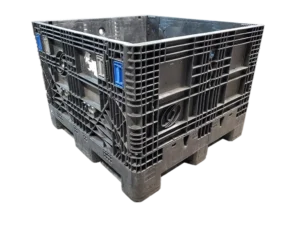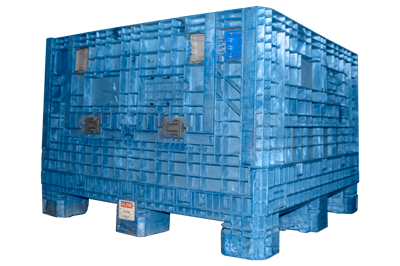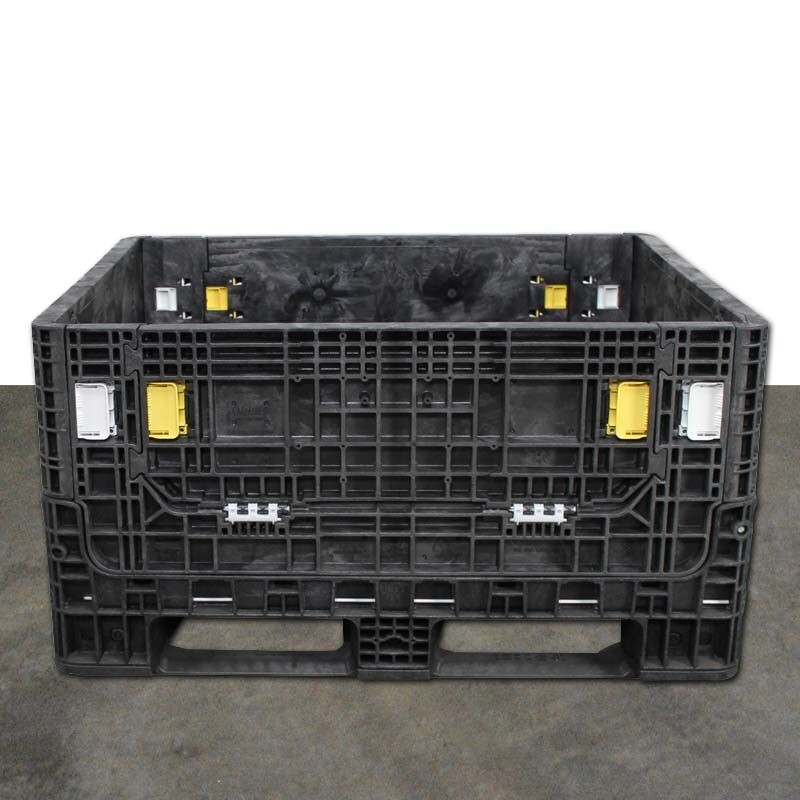Why refurbished bulk containers and used collapsible bulk containers are sustainable assets
Why Bulk Containers Are Important for Sustainable and Affordable Transport
Mass containers play a necessary duty in modern-day logistics. They facilitate the efficient movement of huge quantities of products, thus maximizing transport processes. This method not only reduces expenses but also decreases ecological impact with lower discharges and waste generation. As industries seek even more sustainable practices, the adoption of mass containers is ending up being progressively significant. What effects does this change hold for future logistics and supply chain monitoring?

The Advantages of Using Bulk Containers in Logistics
Bulk containers reinvent logistics by enhancing efficiency and sustainability. These containers permit for the transportation of large quantities of products in a solitary journey, markedly minimizing the variety of journeys needed. This not just improves operations however also reduces labor costs connected with handling, loading, and unloading. On top of that, bulk containers are developed to enhance room utilization within transport vehicles, ensuring that more items can be delivered simultaneously.
The standardization of mass containers additionally simplifies the logistics process. With uniform measurements, they can be conveniently piled and kept, bring about improved stockroom monitoring. Bulk containers typically feature durable materials that protect materials from damages throughout transit, therefore reducing item loss and boosting overall dependability. Therefore, services can experience improved supply chain efficiency, eventually leading to boosted productivity and client complete satisfaction. This combination of elements makes mass containers an important property in modern logistics.
Environmental Influence: Minimizing Waste and Carbon Impact
As industries significantly focus on sustainability, the fostering of bulk containers has become a crucial method for lowering waste and reducing carbon impacts. These containers lessen the use of packaging materials, such as boxes and plastic, consequently significantly lowering overall waste generation. By settling deliveries, mass containers enhance transportation efficiency, enabling even more items to be delivered per trip. This reduction in trips directly associates with reduced greenhouse gas exhausts, contributing to a smaller carbon footprint.
Mass containers can often be reused or reused, additionally minimizing ecological impact. The toughness of these containers warranties they can withstand multiple transport cycles, decreasing the requirement for single-use alternatives. used bulk containers. By enhancing logistics and promoting efficient resource use, mass containers not only support sustainable methods however likewise encourage markets to straighten with global environmental objectives. Eventually, their application reflects a dedication to environmental stewardship and liable source management
Cost Savings: Exactly How Bulk Containers Lower Transportation Costs
While many companies seek methods to boost their lower line, the use of mass containers offers a considerable chance for reducing transport expenses. Bulk containers make the most of the quantity of items transferred, enabling companies to ship bigger quantities at the same time. This efficiency decreases the variety of trips needed, straight lowering fuel costs and minimizing labor expenses associated with loading and discharging.
In addition, mass containers frequently feature streamlined styles that optimize space usage within transport lorries. This indicates fewer voids, resulting in a lot more efficient use of readily available capability. The sturdiness of mass containers can lower the danger of product damages during transit, lowering losses and guaranteeing that even more items show up intact.
Enhancing Supply Chain Effectiveness With Mass Storage Space Solutions
Mass storage space solutions play a crucial role in improving supply chain performance by optimizing stock administration. By settling goods into less, bigger containers, businesses can considerably lower handling costs related to regular transfers and handling. This structured method permits better tracking and administration of stock, ultimately bring about boosted functional performance.
Streamlined Inventory Management
Efficient stock administration is necessary for optimizing supply chain operations, particularly when organizations take on bulk storage remedies. These remedies make it possible for organizations to keep greater supply degrees while reducing the frequency of replenishment. By consolidating materials right into bulk containers, business can streamline their inventory procedures, lowering the intricacy linked with tracking several smaller packages. This approach facilitates accurate inventory counts and improves projecting precision, enabling for more informed decision-making. Additionally, bulk storage services simplify storehouse organization, making it simpler to locate and accessibility items when needed. Consequently, organizations can attain a much more efficient supply turn over rate, ultimately boosting general supply chain efficiency and minimizing the probability of stockouts or overstock scenarios.

Minimized Handling Costs
The application of bulk storage remedies not only improves supply management however additionally considerably decreases handling costs across the supply chain. By combining materials right into bulk containers, companies lessen the need for regular handling and transfer in between various storage and transportation devices. This approach reduces labor expenses associated with loading, dumping, and relocating smaller sized bundles. Furthermore, mass storage space lowers the regularity of deliveries, resulting in lower transportation expenses and reduced fuel usage. Consequently, services can maximize their logistics procedures, permitting for an extra reliable allocation of resources. Eventually, minimized dealing with costs add to improved general supply chain performance, cultivating an environment that sustains both sustainability and economic practicality.

Convenience of Mass Containers Across Numerous Industries
Lots of sectors have distinct needs for transportation and storage, mass containers have actually arised as a flexible remedy that fulfills a large array of demands. These containers, varying from huge containers to specialized containers, can suit varied products, consisting of granules, powders, and fluids. In the agricultural market, mass containers facilitate the transport of plant foods and grains, while the food and drink sector uses them for active ingredients and ended up items. The chemical sector depends on bulk containers for safely moving dangerous materials, ensuring compliance with security policies. Furthermore, building and construction companies take advantage of bulk containers for transferring aggregates and other materials. Their adaptability reaches various modes of transportation, including trains, ships, and vehicles, improving logistical efficiency. This versatility not just enhances operations across various industries yet likewise promotes sustainability by lowering product packaging waste and optimizing room en route. Therefore, bulk containers play a crucial duty in modern-day supply chain management.
Future Patterns in Mass Container Usage and Sustainability
The future of mass container usage is significantly shaped by cutting-edge materials development that improves sustainability. In addition, automation in logistics promises to simplify procedures, decreasing waste and boosting efficiency. Welcoming round economic situation practices will certainly further revolutionize exactly how bulk containers are designed, utilized, and reused, fostering an extra lasting transportation landscape.
Cutting-edge Products Development
As markets increasingly prioritize sustainability, ingenious products development in mass containers becomes a significant consider enhancing green transport services. Researchers and suppliers are exploring naturally degradable plastics, recycled composites, and light-weight steels to minimize ecological influence. These products not only minimize waste however also enhance gas performance by decreasing the total weight of containers. In addition, advancements in smart materials, which can adapt to varying problems, enhance the sturdiness and capability of mass containers. The combination of these ingenious products lines up with round economic climate principles, promoting reuse and recycling. As the demand for sustainable practices grows, the development of such materials will certainly play a vital duty in shaping the future of bulk container use in logistics and transport.
Automation in Logistics
Substantial advancements in automation are poised to transform logistics and the utilization of bulk containers, enhancing sustainability in transport. Automated systems, consisting of drones and self-governing cars, are streamlining the movement of mass containers, lowering the dependence on conventional fuel-powered transport. These modern technologies enhance directing and packing processes, reducing vacant miles and enhancing fuel performance. Additionally, automated inventory monitoring systems boost monitoring and surveillance of bulk containers, ensuring better resource appropriation and minimized waste. The combination of the Internet of Points (IoT) enables real-time data evaluation, making it possible for aggressive decision-making that straightens with sustainability goals. As automation continues to progress, it is expected to drive further technologies in mass container usage, inevitably supporting even more sustainable logistics techniques and minimizing the ecological impact of transportation.
Round Economy Practices
Innovations in automation are establishing the phase for an extra integrated technique to circular economy techniques in the domain name of mass container usage. As markets increasingly embrace sustainability, mass containers are being designed for durability and reusability. This shift not just minimizes waste however also enhances source performance. Companies are adopting techniques such as closed-loop systems, where made use of containers are accumulated, reconditioned, and reestablished into the supply chain. In addition, clever innovations track container life process, facilitating much better administration and lowering environmental impact. The partnership in between suppliers, logistics suppliers, and end-users is essential in establishing standards for lasting container use. used bulk containers. Future trends suggest an expanding focus on materials that are recyclable and naturally degradable, further strengthening the round economic situation's principles wholesale transport

Regularly Asked Concerns
What Products Are Mass Containers Normally Made From?
Bulk containers are generally created from sturdy materials such as high-density polyethylene, steel, aluminum, and cardboard. These materials supply convenience, strength, and protection, making them appropriate for transporting various goods in different sectors efficiently.
Exactly how Do I Pick the Right Dimension Mass Container?
Choosing the best dimension bulk container includes reviewing the quantity of products to be transported, considering handling equipment compatibility, and appraising storage room needs. Correct dimension assurances effectiveness in transport and lessens waste during shipment.
Are Bulk Containers Reusable or Recyclable?
Bulk containers are commonly recyclable, developed for multiple journeys, boosting sustainability. Lots of can likewise be recycled, depending on the products utilized. Selecting recyclable options better sustains environmental goals and lowers waste in transportation practices.
What Security Regulations Relate To Mass Container Transportation?
Safety and security policies for bulk container transportation consist of compliance with the Department of Transport guidelines, appropriate labeling of harmful materials, architectural integrity assessments, and adherence to weight restrictions to ensure secure handling and stop accidents throughout transit.
Just How Can Services Transition to Utilizing Bulk Containers Effectively?
Organizations can alter to bulk containers by reviewing present logistics, training check here personnel on handling, investing in appropriate tools, maximizing inventory monitoring, and teaming up with suppliers to assure compatibility and performance throughout the supply chain.
As sectors increasingly focus on sustainability, the fostering of bulk containers has actually arised as an essential strategy for lowering waste and reducing carbon footprints. By combining products right into bulk containers, business can improve their stock procedures, reducing the complexity associated with tracking several smaller sized plans. As markets progressively focus on sustainability, innovative products development in bulk containers emerges as a significant variable in enhancing environment-friendly transportation options. Automated systems, consisting of drones and self-governing vehicles, are streamlining the activity of mass containers, decreasing the reliance on standard fuel-powered transportation. In addition, automated supply administration systems improve tracking and tracking of bulk containers, guaranteeing much better resource allotment and minimized waste.